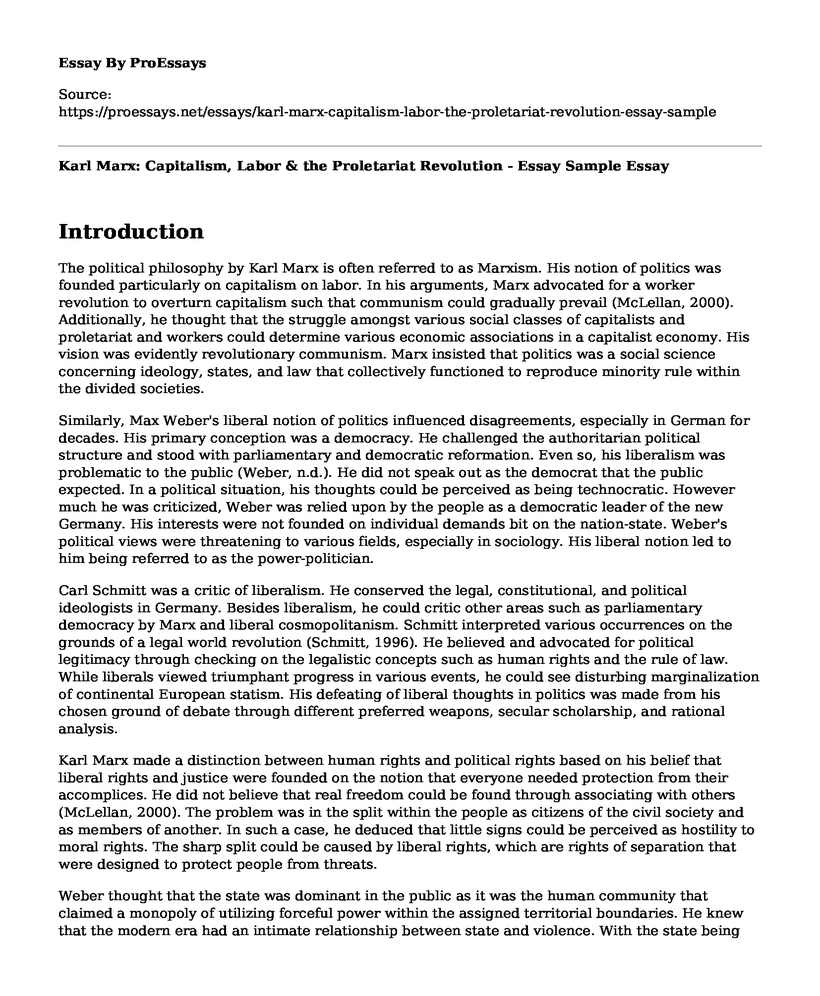Introduction
The political philosophy by Karl Marx is often referred to as Marxism. His notion of politics was founded particularly on capitalism on labor. In his arguments, Marx advocated for a worker revolution to overturn capitalism such that communism could gradually prevail (McLellan, 2000). Additionally, he thought that the struggle amongst various social classes of capitalists and proletariat and workers could determine various economic associations in a capitalist economy. His vision was evidently revolutionary communism. Marx insisted that politics was a social science concerning ideology, states, and law that collectively functioned to reproduce minority rule within the divided societies.
Similarly, Max Weber's liberal notion of politics influenced disagreements, especially in German for decades. His primary conception was a democracy. He challenged the authoritarian political structure and stood with parliamentary and democratic reformation. Even so, his liberalism was problematic to the public (Weber, n.d.). He did not speak out as the democrat that the public expected. In a political situation, his thoughts could be perceived as being technocratic. However much he was criticized, Weber was relied upon by the people as a democratic leader of the new Germany. His interests were not founded on individual demands bit on the nation-state. Weber's political views were threatening to various fields, especially in sociology. His liberal notion led to him being referred to as the power-politician.
Carl Schmitt was a critic of liberalism. He conserved the legal, constitutional, and political ideologists in Germany. Besides liberalism, he could critic other areas such as parliamentary democracy by Marx and liberal cosmopolitanism. Schmitt interpreted various occurrences on the grounds of a legal world revolution (Schmitt, 1996). He believed and advocated for political legitimacy through checking on the legalistic concepts such as human rights and the rule of law. While liberals viewed triumphant progress in various events, he could see disturbing marginalization of continental European statism. His defeating of liberal thoughts in politics was made from his chosen ground of debate through different preferred weapons, secular scholarship, and rational analysis.
Karl Marx made a distinction between human rights and political rights based on his belief that liberal rights and justice were founded on the notion that everyone needed protection from their accomplices. He did not believe that real freedom could be found through associating with others (McLellan, 2000). The problem was in the split within the people as citizens of the civil society and as members of another. In such a case, he deduced that little signs could be perceived as hostility to moral rights. The sharp split could be caused by liberal rights, which are rights of separation that were designed to protect people from threats.
Weber thought that the state was dominant in the public as it was the human community that claimed a monopoly of utilizing forceful power within the assigned territorial boundaries. He knew that the modern era had an intimate relationship between state and violence. With the state being mandated the right to use force, it becomes dominant of the public. The use of violence is the only tangential source of power. Whoever is active in politics strives for power either to serve other intentions regardless of the egoism presented (Weber, n.d.). Legitimate violence supports the relation of men dominating men where the dominated ought to obey the authority.
For Schmitt, politics are to be assessed in terms of the autonomy of a friend-and-enemy difference. This proves the difference between economic liberalism and political authoritarianism. The political is different from economics and aesthetics because of the absence of a substantive distinction on its own. However, the financial distinct the profitable and unprofitable while the aesthetic distinct the beautiful and the ugly. Determining who it is, that decides who the enemy is given a political distinction and a base to fight and die with various other members of a particular group (Schmitt, 1996). It also offers a degree of dissociation that gives a rationale not to kill other members of a hostile group just because they are part of an enemy.
References
McLellan, D. (2000). Karl Marx: Selected Writings. New York: Oxford University Press.
Weber, M (n.d.). Politics as a Vocation.
Schmitt, C. (1996). The Concept of the Political. Chicago: The University of Chicago Press.
Cite this page
Karl Marx: Capitalism, Labor & the Proletariat Revolution - Essay Sample. (2023, Mar 13). Retrieved from https://proessays.net/essays/karl-marx-capitalism-labor-the-proletariat-revolution-essay-sample
If you are the original author of this essay and no longer wish to have it published on the ProEssays website, please click below to request its removal:
- Democracy, Civil Society and Governance
- At & T Company's Change in the Policy Essay
- DNP Nursing - Essay Sample
- Essay Sample on Democracy: A System of Governance for a Fair, Just World
- Difficult Conversations: Resolving Conflicts & Harassment in the Workplace - Essay Sample
- Research Paper on U.S. Presidential Elections: Transforming the American Dream
- Trade Unions: Essential Tools for Worker Welfare in Developing Nations - Essay Sample







